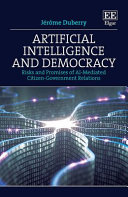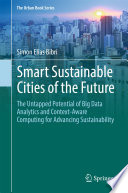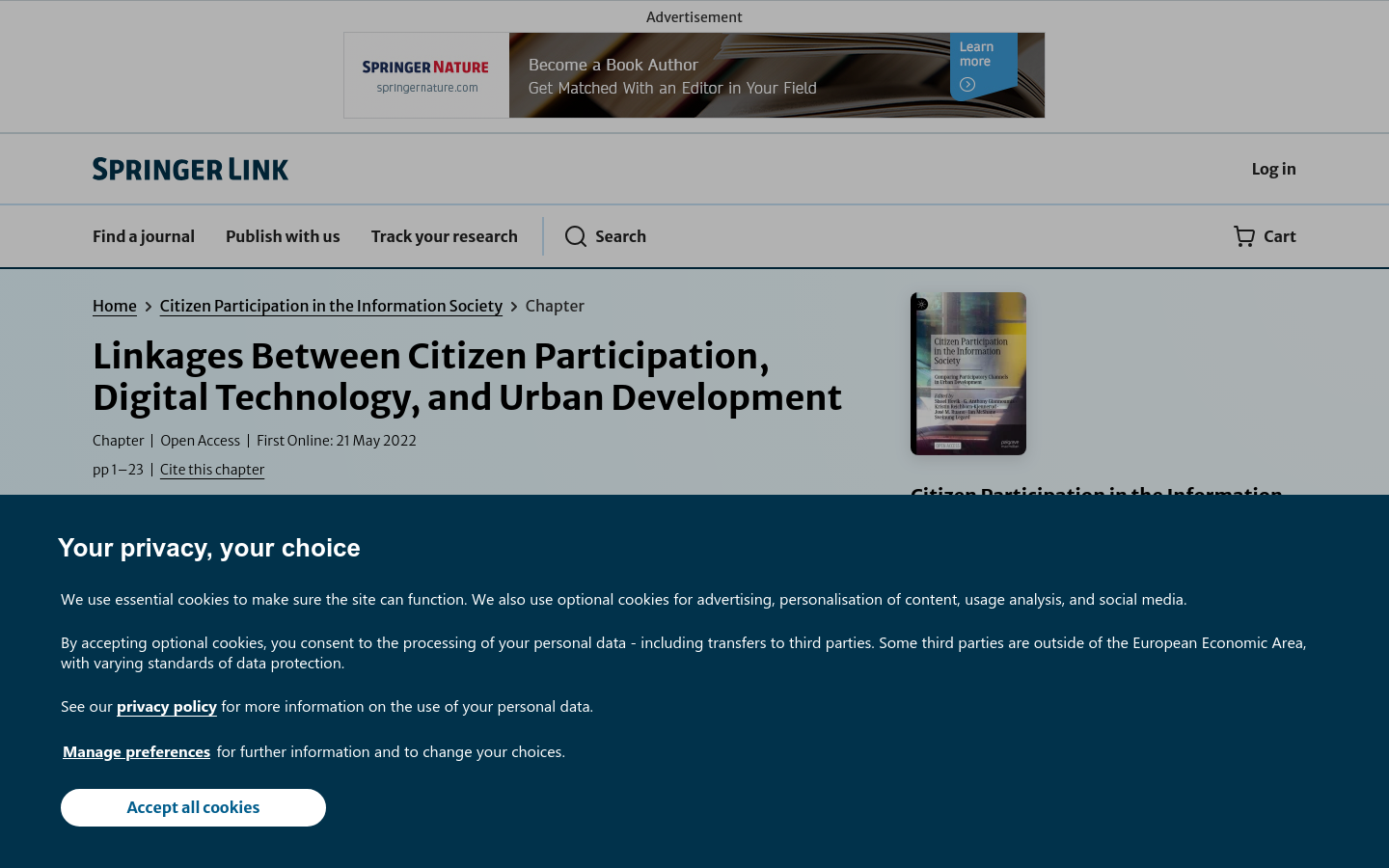Civic Tech Field Guide
Sharing knowledge and productively growing the fieldSearch Results - city (1027)
Showing 1027 Results

Just what is the “participatory condition”? It is the situation in which taking part in something with others has become both environmental and normative

This edited volume discusses smart cities and smart governance within the framework of the 22nd century sustainable city.

This book opens with an examination of the technological reality on which Smart Cities are built, from the chips and sensors that enable us to monitor what happens within the infrastructure to the smartphones that connect individuals.

This book covers: creating meaningful innovations that improve quality of life, engage users and provide value for organizations and other stakeholders, guiding the creation of shared value throughout the innovation process, with a ...

This volume examines these topics theoretically and empirically through a wide spectrum of international case studies providing perspectives from a variety of cities as diverse as Berlin, Hyderabad and Seoul.

This book will be essential reading for students and scholars of democratic theory, as well as anyone who is curious about the prospects for more rational decision-making in an age of populist passion

This book examines deliberative democracy and its practical forms and applications in local government public policy

This book will be a valuable resource for scholars and students across Urban Planning, Sustainability and STS, as well as practitioners and policy makers involved in the development of urban life.

Who Counts? is the story of the lawsuits, congressional hearings, and bureaucratic intrigues surrounding the 1990 census

Social design is design for society and with society. As social innovation and on the basis of dialogue and participation, social design strives for a new networking of the individual, civil society, government, and the economy.

In this eBook, Designing the Urban Future: Smart Cities, we take a good look this relatively new concept, starting with Section 1, "Cities of the Future," which tackles what makes a city smart.

This book lays out an impressive, well-articulated set of trends that have affected or will soon affect local governments throughout the nation through technology.

Moreover, disclosures concerning algorithmic systems often take place when their shortcomings (potential harms) are inadvertently exposed, often through the work of public interest groups

Subjecting this claim to critical scrutiny, in this book, Andrés Luque-Ayala and Simon Marvin examine the cultural, historical, and contemporary contexts in which urban computational logics have emerged.

Social innovations are products, services and models that meet social needs and generate new social connections or collaborations.

In particular, the following key questions are of primary interest: Urban fabric: How is 'sharing' shaping cities? Does it represent a paradigm shift with tangible and physical reverberations on urban form?

This book serves as a vital reference source for urban planners, policymakers, managers, entrepreneurs, graduate-level students, researchers, and academicians seeking coverage on topics centered on conceptual, technological, and design ...

Participatory Budgeting (PB) exists at varying scales in more than 3,000 cities across the globe and the process continues to expand both in scale and in new technology, particularly as digital technologies are being integrated into a ...

The book drives the reader to a better theoretical and practical comprehension of smart city development, beginning with a thorough and systematic analysis of the research literature published to date.

This book explores contemporary urban experiences and how they are connected to practices of sharing and collaboration.

This book presents creative forms of sharing driven by idealistic positions and collective actions, thus offering new approaches to sharing of spaces and architecture, experience and knowledge, data and collective histories

There are several different definitions of smart cities based on the various characteristics related to the adjective Smart and the noun City.

It provides this by providing links to current research, examples from the field, and expert input. It is intended to serve as a supplement to the User's Guide.

For those looking to organize for the first time or for seasoned activists looking to update their repertoire, the time is ripe for a playbook like Becoming a Citizen Activist.

In Collaborative Governance for Urban Revitalization, Michael J. Rich and Robert P. Stoker confront the puzzle of why the outcomes achieved by the original Empowerment Zones varied so widely given that each city had the same set of federal ...

This book rethinks the city by examining its various forms of collectivity – their atmospheres, modes of exclusion and self-organization, as well as how they are governed – on the basis of a critical discussion of the notion of urban ...

This timely book brings together key thinkers and projects from a wide range of fields and perspectives into one volume to provide a valuable resource that would enable the reader to take their own critical position within the topic.

This insightful book explores the citizen-government relation, as mediated through artificial intelligence (AI).

Rethinking the city -- The urban commons -- The city as a commons -- Urban co-governance -- The co-city design principles -- Conclusion: New co-city horizons and challenges

This book aims to give a comprehensive overview of all facets of the Smart City transformation and provides concrete tools, checklists, and guiding frameworks.

And what tools and methods do commoners need to strengthen their work? These are the three questions at the heart of The Urban Commons Cookbook, a handbook for those interested in starting, growing and supporting community-led projects.

This book is intended to help explore the field of smart sustainable cities in its complexity, heterogeneity, and breadth, the many faces of a topical subject of major importance for the future that encompasses so much of modern urban life ...

Whether you're an IT specialist, a city planner, a human resources manager, or any other professional in local government, this book offers a wide array of prompts designed to stimulate innovative solutions, streamline operations, and ...

Examining the changing nature of cities in the face of smart technology, this book studies key new challenges and capabilities defined by the Internet of Things, data science, blockchain and artificial intelligence.

Participatory Budgeting (PB) has expanded to over 1,500 municipalities worldwide since its inception in Porto Alege, Brazil in 1989 by the leftist Partido dos Trabalhadores (Workers' Party).

Is this true? In Uneven Innovation, Jennifer Clark considers the potential of these emerging technologies as well as their capacity to exacerbate existing inequalities and even produce new ones

Highlighting a wide range of topics including community inclusion, cultural innovation, and public safety, this book is ideally designed for urban planners, entrepreneurs, engineers, government officials, policymakers, academicians, ...

Informed by a comparative case study approach, this book seeks to narrow that gap and offer practical policy solutions to facilitate local e-government.

This book offers conceptual frameworks, theoretical insights, and practical lessons for dealing with the problem

This is a non-partisan guide made to help new [UK] MPs & their staff establish and run their offices after the 2024 election.

10x
GSA (General Services Administration), F Street Northwest, Washington, DC, USA10x is the federal government’s very own venture studio

Disability Data Standard
Boston, MAWe want to develop a standard approach to collecting data about disability from constituents and City employees to improve accessibility and inclusion in Boston.

Public Interest Cybersecurity Contest
United States of America (the)The Center for Long-Term Cybersecurity (CLTC) is accepting proposals from members of the public interest cybersecurity community who have ideas that will advance the cybersecurity capacity and resilience of small critical infrastructure at the community level.








